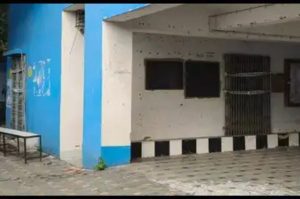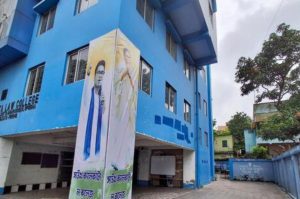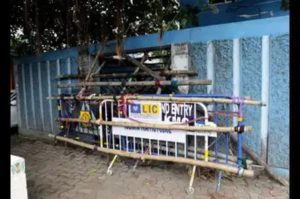South Calcutta Law College— Thirty years after graduating from South Calcutta Law College, advocate and alumnus Anirban Sen returned to his alma mater recently—only to find a campus unrecognizable: union rooms sealed, corridors eerie, and students huddled not over cases and statutes, but over trauma-triggered anxieties. In his words, this is the “saddest phase” in his lifelong connection with the institution—a sentiment now echoing across alumni, faculty, and students alike.

A Campus Steeped in Tradition, Now Haunted by Shock
The institution that once thrummed with classroom discussions, quick-witted litigations, and spirited student unions now stands draped in caution. The gang-rape incident on June 25—involving final-year and ex-student perpetrators—is the turning point.
Anirban recalls,
“As I walked through those gates, I expected legal debates. Instead, I saw taped-off rooms, security checks on ID, and students who looked more frightened than fortified.”
He remembers the union room as a space of ideological clash, not crime:
“We debated, protested, formed youth forums. Now that very space is sealed, its memories marred.”
Three Decades of Change—Now Stalled
Since the 1990s, the college claimed its place as one of Kolkata’s flag-bearers of progressive legal education, excelling in moot court competition and fostering political thought. Alumni like Anirban once debated landmark judgments under neem trees—now swept in construction dust and introspection.
He describes how the college adapted over the years—adding building wings, legal aid cells, and a third-floor library. Yet, he sees today’s disruptions as more than loss—they are trust ruptures.


An Oasis of Idea Exchange Becomes a “Freeze Zone”
Even as academics resume cautiously—exam forms and project submissions under police watch—there’s a palpable emotional freezing.
“Students sit in spaced silence,” says Anirban.
“No laughter, no chatter, only quick in-and-out academic visits. How long will this last?”
Long-time staff tell similar stories: hallways once echoing debate are now subdued; classrooms that trained advocates now shelter shaken minds.
Alumnus Disillusionment & Institutional Responsibility
Anirban contends:
“We alumni celebrated our college’s public spirit—but it needed more safety guardrails. Political unions without oversight — that was always a risk.”
He believes the combination of a toxic student leadership culture and unchecked access to union space created the ecosystem for the crime.
For him, the saddest reality isn’t trauma—it is the college’s structural neglect.


South Calcutta Law College: Reforms in Alumni’s Wish List
- Permanent ID checks and campus surveyorship
Alumni advocate for security gates and photo-ID issuance as long-term staples. - Union Room Re-engineering
Designed as debating platforms, union rooms now need CCTV, restricted access, and active tutoring oversight. - Mental Health Infrastructure
On-site counseling, drop-in sessions, weekend workshops to help students heal and feel safe in the space they perform in. - Grievance Advisory Board
A hybrid body with alumni, faculty, police, and students to oversee strategic campus safety.
A Mirror for Other Colleges
Anirban warns that South Calcutta is not unique. The mix of politicised student bodies and lax management is a pattern found in many Indian institutions.
He says:
“Other college alumni must ask—is safety a convenience or a core value?”
He hopes this moment becomes a fulcrum—enabling law colleges to lead in campus reform, not fear.
The Personal Toll of Producing Tomorrow’s Lawyers
For Anirban, he cannot separate his educational journey from his professional oath. He notes:
“It hurts to walk the corridors where I prepared pleadings, now knowing a student faced hell in the same spaces.”
That dissonance, he says, threatens the identity of law education itself.
Hope Through Community: Alumni Mobilisation
Despite the sorrow, Anirban says a seed of hope is sprouting:
- Alumni-led webinars on campus safety
- Mentorship calls offering trauma care knowledge
- Fundraising for secure campus systems
In this ground-up mobilization, he sees a shift: alumni moving from silent pride to active responsibility.
External Resources for Structural Campus Reform
- UGC Guidelines on Student Safety: https://www.ugc.gov.in/pdfnews/2827340_Safety-measures-guidelines.pdf
- National Commission for Women’s Campus Audit Toolkit: https://ncw.nic.in/college-safety-audit
- NIMHANS Resources on Campus Mental Health: https://nimhans.ac.in/mental-health-resources
- International Models of Student Union Oversight (case studies from UK/US universities)
Final Reflection—A Choice Between Mourning and Reform
Anirban summed it up:
“This is the saddest phase—for our students, alumni, and the very ethos of law. But if this becomes the moment we fix the foundations—then perhaps it led to a stronger, safer institution.”
He concluded,
“Our college has always shaped voices against injustice. It’s time it speaks up—not for arguments, but for accountability.”
Also read: Home | Channel 6 Network – Latest News, Breaking Updates: Politics, Business, Tech & More

